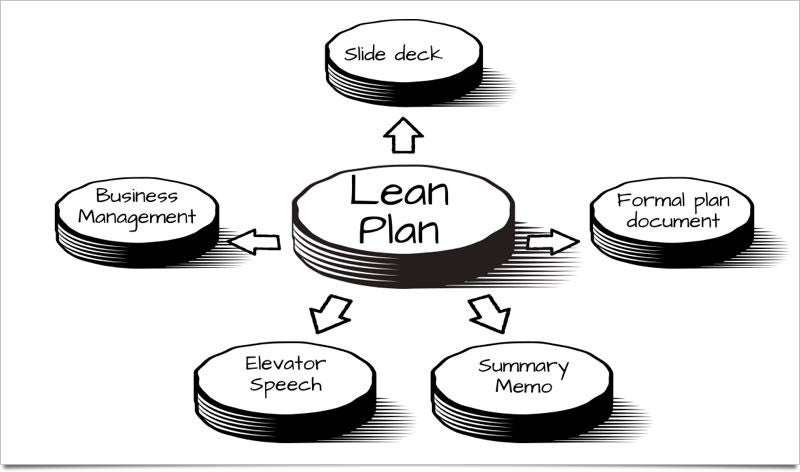
Efficient business in general means avoiding waste, doing only what has value. Therefore the right form for your business plan is the form that best serves your business purpose. Furthermore, for the vast majority of business owners, the business purpose of planning is getting what you want from the business—setting strategy and tactics, executing, reviewing results, and revising as needed. And that purpose is best served with lean business planning that starts with a lean plan and continues with a planning process involving regular review and revision. You keep it lean because that’s easier, better, and really all you’re going to use.
Form follows function
Consider the illustration that follows. I call the central image the lean plan because the lean business plan is about what is supposed to happen, when, who does what, how much it costs, and how much money it generates. It’s a collection of decisions, lists, and forecasts. It doesn’t necessarily exist as a single document somewhere. You use it to track performance against plan, review results, and revise regularly, so the plan is always up to date. I hope it’s gathered into a single place, as if it were a document, but it doesn’t have to be. And it’s only as big as you need for its business function.
The main output, and therefore the main purpose, of the lean business plan is better business, which means getting what you want from your business. That’s what your lean plan is for and that function determines what’s there. Forget the additional descriptions for outsiders until you need them. Wait for that until you have a business reason for it. But don’t let not having to show a plan keep you from using planning to help your business.
The lean business plan is the bones of other business planning outputs, including a summary, a pitch slide deck, and a full business plan document, if you need one. Do the lean business plan, keep it up to date, and to the rest as the need arises. Maybe you’ll never need to do the formal document. But you’ll always need strategy, tactics, milestones, metrics, and essential business projections.
Know your market, yes; describe, analyze, prove – not necessarily
You have to know your market extremely well to run your business. Know your market like you know the back of your hand. Know your customers, what they need, what they want, how they find you, what messages work for them, what they read, what they do, and all of that.
What you don’t have to do, however, is include any of that in your lean business plan. A lean plan doesn’t need rigorous market analysis. It doesn’t normally include supporting information—at least, not until later, with the business plan event, when it is actually required.
However, your lean plan is about what’s going to happen, what you are going to do. It’s about business strategy, specific milestones, dates, deadlines, and forecasts of sales and expenses and so forth. It’s not a term paper. Yes, you should know your market. But you don’t have to prove it until you’re trying to find outside investors.
Form follows function: The function of the lean business plan is management, not selling something to outsiders.
You don’t need supporting information. It’s still a business plan without it. It still serves its business purposes. You don’t have to do a rigorous market analysis as part of your plan if you know exactly what you’re offering, and to whom. So what about market analysis? Think about the business purpose. Do you need the market analysis to help determine your strategy? Then do it. Are you ready to go with that strategy regardless? Then don’t sweat the market analysis.
This is ultimately your responsibility. You don’t gather all the supporting information and do a rigorous market analysis just because somebody said you should. You do it if you’re actually going to use it to make decisions, or if your business purpose requires proving that there is an attractive market opportunity. You do need to know; but proving your knowledge isn’t necessarily part of the plan.
Stick to your business purpose
Planning is about managing. It’s a tool to set priorities, milestones, metrics; to track results, compare results to expectations, and steer the business.













